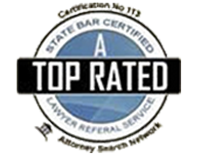TOP RATED CACI DEFENSE LAW FIRM
If you have been placed on the Child Abuse Central Index (CACI), it can have serious personal and professional consequences. You only have one opportunity to have your name removed from the Index and should hire an attorney who has significant experience in the grievance hearing process. For over a decade, our firm has successfully represented individuals who have been placed on CACI. Our firm’s success in removing people from CACI has been recognized by our peers in the legal community and we were the featured speaker for the CACI training seminar for the Los Angeles Dependency Lawyers (LADL) five law firms in both 2018 and 2019.
Please contact us if you need assistance in ascertaining whether your name is on CACI, help requesting a grievance hearing or if you have requested a grievance hearing and need an attorney to represent you during the hearing process.
For your convenience, a comprehensive summary of the Child Abuse Index, the implications of being placed on the index and your legal rights are summarized below.
LEGAL SERVICES PROVIDED:
- Grievance hearing eligibility assessment
- Preparation and filing of grievance hearing request
- Grievance hearing adjudication
- Grievance hearing appeals
GRIEVANCE HEARINGS
GRIEVANCE HEARINGS: WHAT ARE THEY?
Grievance hearings are quasi-judicial proceedings where CPS presents evidence supporting the CACI listing to a grievance hearing review officer and the listee presents their defense attempting to establish the listing agency did not meet their burden of proof by producing adequate evidence supporting the substantiated child abuse/endangerment findings.
WHO ATTENDS HEARINGS
The following individuals from the government’s side are present at the grievance hearings: The Grievance Hearing Review Officer, a representative from the listing county agency, the investigator from the reporting agency who conducted the investigation (or their supervisor if they are not available) and an attorney from either the Office of County Counsel or the Attorney General’s office. The CACI listee can either represent themselves at the hearing or can retain an attorney to represent their interests at the hearing.
DISCOVERY PROCESS AND EVIDENCE
Prior to the grievance hearing, a representative from the reporting agency will re-examine all records and relevant evidence that formed the basis for the CACI listing in addition to any other evidence they intend on introducing at the grievance hearing. After their review, the county will redact names and personal identifiers from the records and other evidence as required by law to protect the identity of the mandated reporters of suspected child abuse pursuant to Penal Code section 11167. This redacted evidence is made available for inspection by the CACI listee and their counsel. Similarly, the CACI listee is required to provide all evidence and witnesses that will be present at the grievance hearing.
Neither the grievance hearing officer, the county agency or the CACI listee has subpoena power at the grievance hearing and it is not possible to compel the attendance of witnesses who refuse to voluntarily attend the hearing or to subpoena documentation such as medical records or other reports that are not contained in the complainant’s discovery.
All testimony is made under oath and false testimony that comes to light during or after the grievance hearing may impact the findings made by the grievance hearing review officer.
The length of the grievance hearings themselves vary depending on the evidence and can be as brief as a few hours or last for several days.
DECISIONS
The grievance hearing review officer makes a determination whether the allegation(s) of child abuse and/or severe neglect is unfounded, inconclusive or substantiated as defined by the Penal Code section 11165.12. After this finding is made, the grievance review officer shall render a written recommended decision within thirty (30) calendar days of the completion of the grievance hearing. The decision contains a summary statement of facts, the issues litigated at the hearing, findings and the basis for the decision. The County Agency Director will issue a final written decision adopting, rejecting, or modifying the recommended decision within ten (10) business days after the recommended decision is rendered.
faqs
WHAT IS CACI?
The California Attorney General administers and maintains the Child Abuse Central Index (CACI) database. The index contains information related to substantiated cases of physical abuse, sexual abuse, mental/emotional abuse and/or severe neglect of a child.
CACI HAS 3 PRIMARY PURPOSES
1. Sharing Information with Law Enforcement
Local and state law enforcement agencies and prosecutors use CACI as a tool during investigations. The index is routinely cross-checked to identify suspects and/or victims who have been involved in prior investigations and to retrieve information such as police reports, witness information and abuse findings for use in their current matter. In 2008 ca’s attorney general’s office expanded access to CACI and made information available to out-of-state law enforcement agencies (as well as out of state foster care and adoption agencies, explained in more detail in background checks section)
2. Employment Background Checks
Organizations and employers that employ individuals who may come in contact with children directly or indirectly are required to screen job applicants and employees on a regular basis to ensure they are not on CACI. Employees who are listed on CACI may not continue to be employed by that organization and must be barred from entering the grounds and premises of those facilities in perpetuity unless they are removed from CACI. The types of organizations/employers that are required to and search CACI include but are not limited to:
A) Schools for their teachers, teacher assistants, food service employees, custodial staff, groundskeepers, administrative staff.
B) Law Enforcement for their peace officers and secretarial staff.
C) Community Care Licensed facilities including FFA employees, licensed foster parents, licensed Daycare staff, Drug recovery residential facilities, Domestic Violence shelters.
D) Medical profession including Medical Doctors, RPN’s, RN’s, Nurse Practitioner’s, Nursing Assistants.
E) Legal field including attorneys, bench officers and court staff, Caseworkers.
F) Military including Military Police and Officers.
3. Foster Care and Adoptive Placements Background Checks
A) Foster Parents- A CACI search is required for; family members, relatives and family friends who are interested in fostering a child that is involved with Child Protective Services. A positive CACI hit for those individuals or anyone else residing in their home will disqualify them as a potential placement for the child.
B) Adoption Home Study- CA law requires all prospective adoptive parents to complete an adoption home study before accepting an adoptive placement and/or finalizing an adoption. A CACI listing for Any home study applicant or member of their household will prevent the home study from being approved.
WHAT IS PURPOSE OF CACI?
CACI HAS 3 PRIMARY PURPOSES
1. Sharing Information with Law Enforcement
Local and state law enforcement agencies and prosecutors use CACI as a tool during investigations. The index is routinely cross-checked to identify suspects and/or victims who have been involved in prior investigations and to retrieve information such as police reports, witness information and abuse findings for use in their current matter. In 2008 California's Attorney Generals office expanded access to CACI and made information available to out-of-state law enforcement agencies (as well as out of state foster care and adoption agencies, explained in more detail in background checks section)
2. Employment Background Checks
Organizations and employers that employ individuals who may come in contact with children directly or indirectly are required to screen job applicants and employees on a regular basis to ensure they are not on CACI. Employees who are listed on CACI may not continue to be employed by that organization and must be barred from entering the grounds and buildings of those facilities in perpetuity unless they are removed from CACI.
The types of organizations/employers that are required to and search CACI include but are not limited to:
A) Schools including; Teachers, teacher assistants, food service employees, custodial staff, groundskeepers, administrative staff.
B) Law Enforcement including; Peace Officers and secretarial staff.
C) Community Care Licensed facilities including FFA employees, licensed foster parents, licensed Daycare staff, Drug recovery residential facilities, Domestic Violence shelters.
D) Medical profession including Medical Doctors, RPN’s, RN’s, Nurse Practitioners, Nursing Assistants.
E) Legal field including; Attorneys, bench officers, and court staff
F) Military- including; Military Police and Officers.
3. Foster Care and Adoptive Placements Background Checks
A) Foster Parents- A CACI search is required for; family members, relatives and family friends who are interested in fostering a child who is in the custody of Child Protective Services. A positive CACI hit for those individuals or anyone else residing in their home will disqualify them as a potential placement for the child.
B) Adoption Home Study-CA law requires that all prospective adoptive parents complete an adoption home study before an adoptive placement is finalized. A CACI listing for ANY home study applicant or member of their household will prevent the home study from being approved.
HOW DO I FIND OUT IF I’M ON CACI?
1. Notification is sent by Child Protective Services to your last known address.
2. Self Inquiry- If you do not receive notice that you have been placed on CACI but suspect you are on the index or have been told you are by a current/potential employer/licensing agency submit a self-inquiry form here
DO I NEED A LAWYER?
Are there attorneys who specialize as a CACI Attorney and do you need one? Yes, there are attorneys who regularly practice in front of the Office of CACI Appeals and who qualify as an expert CACI Attorney. It is in your interest to hire someone with this expertise because being placed on CACI can have serious professional and personal consequences. A CACI lawyer will ascertain whether your name is on CACI, inform you of the potential consequences it will have on your career, request a grievance hearing on your behalf and act as your CACI lawyer at the hearing.
HOW LONG WILL I STAY ON CACI?
1. Adults- Any person who was 18 years old or older at the time they were placed on CACI is on it for their life unless they make a timely request for and prevail at a Grievance Hearing.
2. Minors- Any person who is under the age of 18 at the time they were placed on CACI will remain on the index for 10 years from the time they were placed on index unless they make a timely request for and prevail at a Grievance Hearing
WHAT PERSONAL INFORMATION ABOUT ME IS ON CACI?
The names and biographical info of both the alleged perpetrator and victims. Specifically, the index includes the victim’s name, DOB, sex, race, and description of their injuries. For suspects, the index lists their name, DOB, address, race, height, weight, eye/hair color and relationship to the victim and the reporting agency that investigated the incident. Also included are the name and/or number assigned to the case by the investigating agency and type(s) of abuse investigated.
WHAT SHOULD I DO IF IM ON CACI?
An individual wishing to challenge a CACI listing may request a grievance hearing by submitting via U.S. mail, fax or in person a completed SOC 834 form. The request must be signed and include the referral number, name of county agency who listed you on CACI, your contact information and the reason you are requesting a grievance hearing (e.g. investigative findings untrue). Your request for a Grievance Hearing must be timely or your request will be denied. To be timely, your request must be postmarked within thirty (30) calendar days of the date on the notice- NOT 30 days from the date you received notice. If you learned of your CACI listing after submitting a self-inquiry request to the Office of Attorney General, you have forty-five (45) calendar days from the date of the AG’s notice. If you did not receive either form of notice but subsequently learn of your CACI listing, there are protocols for challenging proper notice which should be discussed with an attorney.
APPEALS:
If you receive an adverse ruling in your grievance hearing you have the right to file a writ of mandamus with the Superior Court challenging any violations in the procedure, protocol or other grievance hearing rights.







